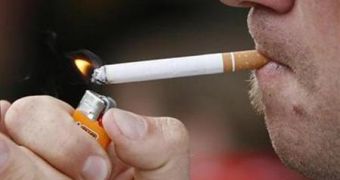A new study carried out at the Harvard School of Public Health in Boston and Columbia University in New York shows that former smokers or nonsmokers have increased chances of having strokes as a result of inhaling cigarette smoke exhaled by other people. The research team also points out that being married to a smoker raises the chances of having a stroke by 42 percent in comparison with couples who had never lit a cigarette in their lives.
The effects of passive smoking are further exacerbated in the case of people who quit smoking and are still married to a smoker, the chances of having a stroke further increasing to 72 percent, roughly close to the risk to which current smokers are exposed.
"Quitting smoking helps your own health and also the health of the people living with you," said lead author of the study, Maria Glymour of Harvard School of Public Health in Boston and Columbia University in New York. Glymour investigated over a period of nine years the health status of 16,225 people with ages over 50 that never had strokes, and found conclusive evidence that passive smoking causes a series of health problems.
Although similar studies had previously reached the same conclusions regarding the stroke risks of people exposed to secondhand smoking, the research team argues that investigations were mostly made on smokers rather than on nonsmokers. Other affections linked to passive smoking involve lung cancer, nasal sinus cancer, respiratory tract infections and heart disease. Involuntary inhaled cigarette smoke was also found to contain several hundreds of toxic chemicals, amongst which formaldehyde, benzene, vinyl chloride, arsenic, ammonia and hydrogen cyanide.
The study is said to have investigated passive smoking only in the case of cigarettes, but similar effects could be experienced in the case of pipes and cigars and did not look at the long term stroke risks in children. "We know that there are a lot of undesirable health consequences for kids, especially asthma and breathing problems that are exacerbated by secondhand smoke," said Glymour in an interview.

 14 DAY TRIAL //
14 DAY TRIAL //